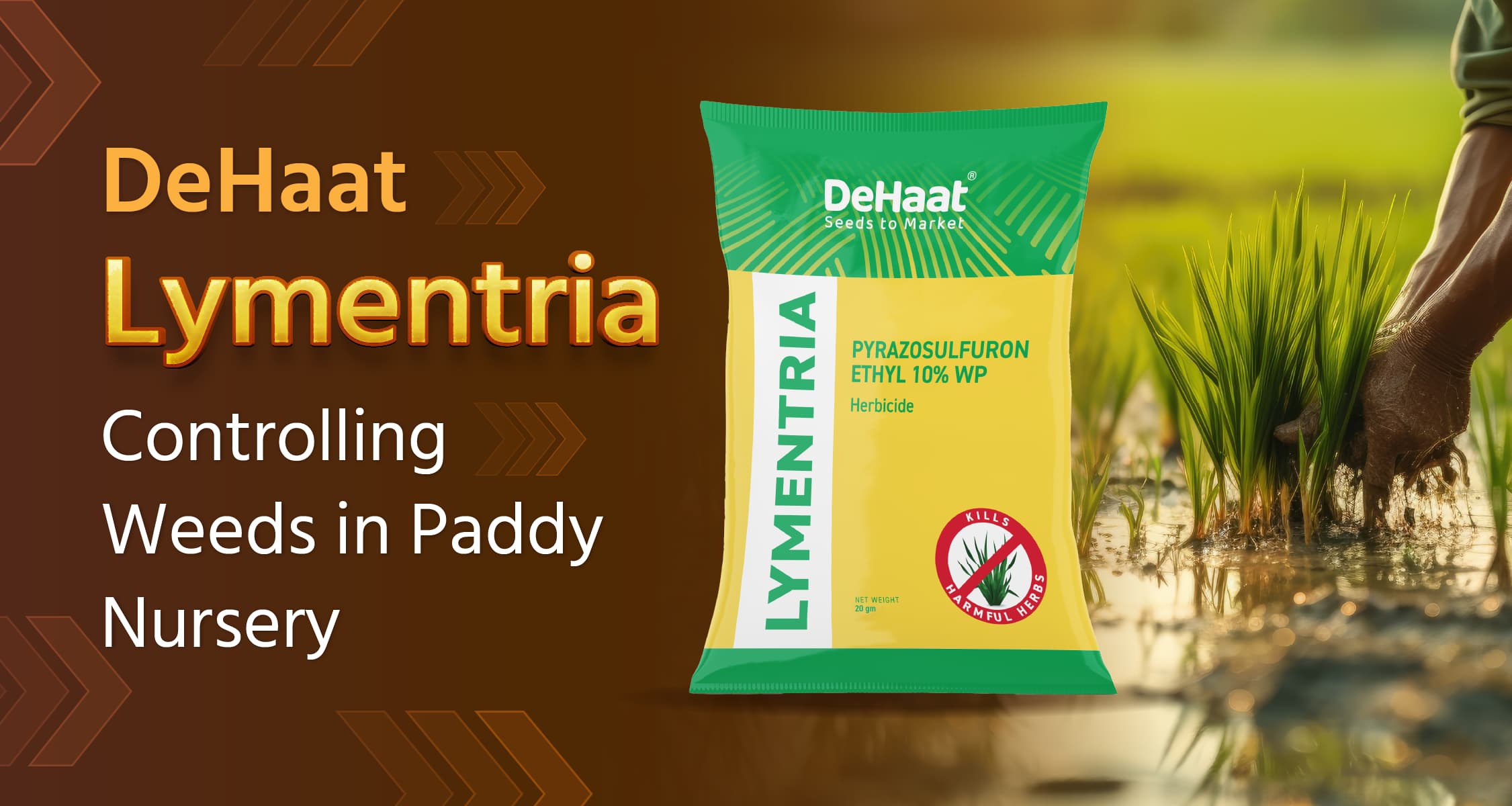'DeHaat Lymentria' for Weed Control in Paddy Nursery

The problem of weeds in rice nurseries is quite prevalent, in almost all areas. It is very important to control them in time. By controlling weeds in rice nurseries, we can obtain healthy plants. Along with this, the growth of plants also happens rapidly. For weed-controlling purposes, DeHaat Lymentria product is an effective option that can be used in paddy nurseries. Read this post carefully for detailed information about this excellent herbicide product by DeHaat.
Impact of Weeds on Paddy Nursery
- Difficulty in Germination: The germination of seeds becomes difficult due to weeds in the rice nursery. Sometimes, seeds fail to germinate due to the increasing problem of weeds.
- Weak Seedlings: Weeds absorb the nutrients present in the soil, which adversely affects the seedlings in obtaining the required nutrients. Hence, this results in weak seedlings.
- Decreased Resistance: Excessive weeds make the seedlings weak by absorbing the essential nutrients and other elements in the rice nursery and reducing their resistance. This increases the likelihood of various diseases and pest infestations.
- Economic Losses: Various weeds in the rice nursery hinder seed germination and hence, affect the development of plants adversely. This may lead to farmers facing economic losses in the long run.
Various Methods of Controlling Weeds in Paddy Nursery
- Before planting rice, do proper plowing in the nursery. This makes it easier to eliminate existing weeds that are present beforehand.
- For controlling weeds in the nursery, do hoeing and weeding. If the nursery is small, use hands instead of large agricultural tools or machinery for hoeing and weeding.
- You can also control weeds in the rice nursery using small agricultural tools like a khurpi.
- If the problem of weeds in the nursery is severe, you can use chemicals for weed control. Before using chemicals, pay attention to the proper timing and dosage.
Advantages of ‘DeHaat Lymentria’ Herbicide
- DeHaat Lymentria is an excellent herbicide/weedicide containing Pyrazosulfuron Ethyl 10% WP.
- It is effective in controlling both broad-leaf weeds and narrow-leaf weeds like sedges.
- It can be applied by both foliar spraying and broadcasting methods.
- It is completely safe for rice crops.
- It is more effective at lower dosage rates and provides long-term control of weeds.
Doses of 'DeHaat Lymentria' for Paddy Nursery
- Use 80 gm of DeHaat Lymentria (Pyrazosulfuron Ethyl 10% WP) per acre of land in the paddy nursery to control weeds.
Available SKUs of DeHaat Lymentria
- The product is available in the market in packets of 20 gm and 80 gm.
Which method do you use to control weeds in the rice nursery? For more information on weed control and methods, follow the 'Weed Management' channel now. Also, don't forget to like and share this post.
Frequently Asked Questions (FAQs)
Q: How to control weeds in a rice nursery?
A: Getting rid of weeds in a rice nursery is quite challenging for farmers. If the nursery is small, you can manually remove and destroy the weeds. However, if the nursery is not small, you can also use chemicals like weedicide, DeHaat Lymentria, to control the issue.
Q: Which weeds are most common in rice?
A: Among the other common weeds found in rice fields in India are Cyperus rotundus (nutgrass), Scirpus juncoides (bulrush), etc. These are fast-spreading weeds that compete with rice plants for nutrients, water, and sunlight and affect the crops adversely in their proper growth.
Q: Which chemicals should be used for weeds in rice?
A: When using weedicides/herbicides in rice crops, it is essential to consider several factors such as the type of weeds, the condition of the crop, the level of moisture in the field, etc.
जारी रखने के लिए कृपया लॉगिन करें

फसल चिकित्सक से मुफ़्त सलाह पाएँ
